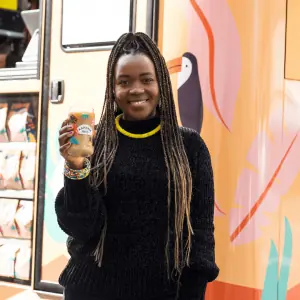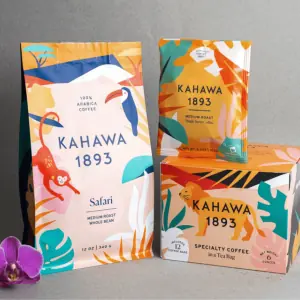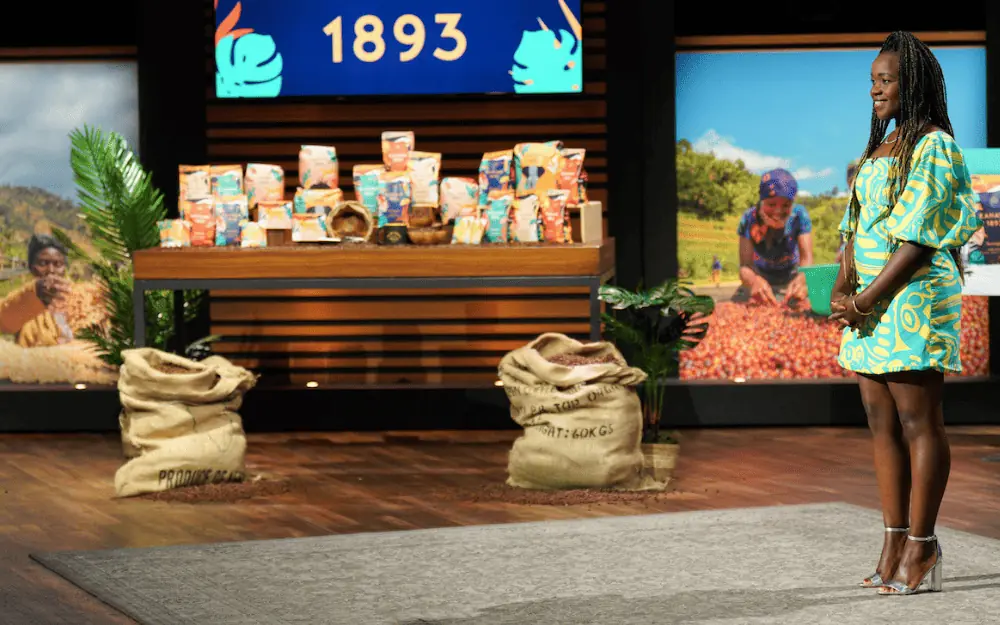Kahawa 1893 is a coffee company with a new twist. The company roasts and markets Kenyan coffee, which it sources directly from women farmers, in hopes that that they are able to provide a new way to fairly compensate African women for all of their hard work in growing and processing some of the world’s best coffees. But, what will the Sharks think about this African coffee, and of the company’s goal of supporting female farmers in Kenya? Read all about it in our Kahawa 1893 Shark Tank update.
What is Kahawa 1893?
Kahawa 1893 is a company which produces Keyan coffee for the retail market. The company sources its coffee directly from women farmers and seeks a new way to compensate coffee farmers. Kahawa 1893 is based in Berkeley, California.
Kahawa’s founder, Maggy Nyamumbo, grew up in Kenya, so she understood that while 90% of the labor in the coffee business in Kenya is performed by women, men own the land, so women aren’t compensated well for their work. This is the mission behind Kahawa 1893, to make sure that women are better paid for their work harvesting and processing Kenyan coffee.
Who created Kahawa 1893?

Kahawa 1893 was founded by Maggy Nyamumbo who was raised in Kenya where her grandfather owned a coffee farm. After Maggy graduated from highschool, she won a scholarship to study as an undergraduate in college; however, when Maggy was awarded the scholarship, she couldn’t afford the plane fare to the US, so her village in Kenya raised funds to help pay for her transportation.
Maggy took advantage of her opportunity to study in the US, as after her undergraduate degree, she studied abroad at the London School of Economics, and then she completed an MBA at Harvard University. After she received her MBA, she went to work on Wall Street to begin a career in finance, but before long, the brilliant student from Kenya found herself thinking about the coffee farmers back home in Kenya.
How did Kahawa 1893 get started?
In an interview in Shout Out LA, Kahawa 1893 founder Maggy Nyamumbo told the publication that after she graduated from Harvard with her MBA, she moved to New York City to begin a career in Finance, and it was while exploring the New York City coffee scene on her weekends, she realized that people were willing to pay $5.00 for a cup of coffee, while, she knew, the coffee farmers back home in Kenya were still not getting paid well. She believed that the farmers, particularly the women who supplied most of the labor in the coffee business, were worse off now than they were in the 1960s. This realization helped her to envision Kahawa 1893.
Maggy started Kahawa 1893 while still living in New York, but the business really began to take off when she relocated to San Francisco to grow the business, and after her move to the Bay area, Kahawa 1893 was launched into Trader Joe’s.
What happened to Kahawa 1893 before Shark Tank?
Kahawa 1893 founder Maggy Nyamumbo, began thinking about the specialty coffees she was enjoying in New York City, and the ties between the coffee business and Kenya, where she grew up. She then decided to apply some of the skills she acquired as a top student, and as Maggy told the Daily Coffee News, she could see that “the specialty coffee movement was growing. People were curious about where coffee was coming from, and I became interested in the coffee we used to export.” She next began to study coffee roasting and evaluation skills under a mentor, and this eventually led to the launch of Kahawa 1893 in 2017.
During her time in the Tank, Maggy revealed to the Sharks that the company had revenues of $2 million in 2022, and that they had $1.3 million year-to-date when the pitch was filmed, and she was projecting sales of $4 million for 2023, and $10 million in 2024.
At the time of her appearance in front of the Sharks, Kahawa 1893 had already been introduced in Trader Joes, and it was the first black-woman owned coffee brand to launch into any national chain. After getting into Trader Joe’s, other large retailers, including Target, had approached the company with interest in carrying the brand.
What do customers think of Kahawa 1893?
We took a look at the Kahawa 1893 coffees which are available on Amazon, and one of their primary products, the Kenya Single Origin coffee, had 288 ratings. Amazon customers rated the coffee overall at 4.4 out of 5 stars, with 85% of reviewers giving the coffee 4 or 5 stars, and only 2% rating the coffee at 1 star.
What are customers saying about Kahawa 1893?

With 85% of reviewers giving the coffee 4 or 5 stars, we expected a lot of positive comments, and that is exactly what we found. One very happy Amazon purchaser wrote simply, “This is the best coffee I’ve tasted.”
Another satisfied Amazon coffee aficionado stated:
“I have roasted green beans at home for nearly a decade – being an absolute coffee addict – and bought a bag of these beans on a lark, not expecting a lot from them. Nearly all roasted Kenyan beans are either too dark or totally under-roasted.
My addiction to perfectly roasted Kenya coffee is what lead me to undertake the difficult process of learning how to do it myself, starting with an air roaster but quickly moving up to a one-pound batch Behmor machine. It’s tricky to get everything right, but this vendor nailed it! No other coffee in the world has the earthy sweetness of Kenya coffee, when done correctly. This bean’s test was flawless, and I’ve just ordered two more bags!”
Even among all of the positive comments on Amazon, we did find a few folks who were not impressed with the Kenyan coffee. One verified purchaser wrote, “The taste did not fit the hype as presented on Shark Tank. I believed in what the purpose of the business was, to empower women in business. The taste of the coffee was very disappointing.”
Another disappointed Amazon customer titled their review, ‘Sorry, just not my idea of coffee.’ They go on to say, “Neither the smell or the taste lives up to its happy packaging.”
Despite a few negative comments, the overwhelming consensus on Amazon is that Kahawa 1893’s Kenya Coffee offering is a great-tasting, premium coffee.
When did Kahawa 1893 appear on Shark Tank?
Kahawa 1893 appeared in the Tank in Season 14, Episode 14, which aired on February 17th, 2023. The company pitched to regular Sharks Mark Cuban, Lori Greiner, Kevin O’Leary, Robert Herjavec, and Guest Shark Emma Grede, co-founder and CEO of fashion brand Good American.
Along with Kahawa 1893, Frescos Naturales, a successful latin-influenced beverage company, pitched in the Tank in Season 14.
What happened to Kahawa 1893 on Shark Tank?
Maggy Nyamumbo, founder of Kahawa 1893, entered the Tank and asked the Sharks for an investment of $350k for an equity stake of 5% in her company.
When Maggy started her pitch, she asked the Sharks, “Do you know that the best coffee in the world grows in Kenya?” She then explained to the Sharks that she grew up on her grandfather’s coffee farm in Kenya, and she said that Kenyans were very proud of the coffee that grows in their soil. But, she said, that there is also a catch, “The farmer’s don’t always make enough, and while women provide 90% of the labor in coffee, they are not compensated well because they don’t own the land.”
Maggy then told the Sharks that this is the reason that she wanted to create a new way to compensate farmers. She said that her business sources its coffee directly from women coffee farmers in Africa, but they go one step further in allowing customers to tip the women who process the coffee, and the company then matches the tips.
Next, the Sharks all sampled the coffee, and even tea-drinking Guest Shark Emma Grede said, “this is a good cup of coffee.” Following a few comments on the quality of the coffee, Lori then asked how the tips to farmers worked. Maggy told her that using a QR code on the back of the bag, customers can leave a tip, and the company then matches it. All of the Sharks seemed very impressed with this idea.
Robert then asked about the company name, “What happened it 1893?” And Maggy responded that commercial coffee was first commercially grown in Kenya in 1893, and she told him that Kaha means coffee in Swahili, the language spoken in Kenya. Maggy also explained that the males in Kenya almost always own the land, so they get most of the money from coffee sales, but she had worked it out with the men that any tips received would go to the women.
Mark asked how much had been received in tips, and Maggie disclosed that customers had tipped $10k and the company had matched it. Lori next wanted to hear about Maggie’s background, and Maggie told her that while she grew up on her grandfather’s coffee farm in Kenya, after graduating from highschool, she won a scholarship to attend college in the US, and because she didn’t even have enough money to buy a plane ticket, her village raised funds for her trip, and the sent her to the US with $200 in her pocket.
Maggy then told the Sharks that after her undergraduate education, she studied abroad at the London School of Economics, and she then attended Harvard University where she earned an MBA. While all of the Sharks were impressed with her story, Kevin O’Leary was now ready to question the $2 million valuation of the business. O’Leary learned that the company had $2 million is sales in 2022, and they were projecting $4 million for 2023, and $10 million for 2024.
Lori then asked Maggy how they were selling the coffee, and she explained that they sold 85% of their products into retail markets, and 15% direct-to-consumer. Maggy also revealed that the average retail price was $14.99, and they sold them at wholesale at $8, with a cost of about $5 to produce. The Sharks also learned that the company was currently profitable.
Mr. Wonderful set off a whirlwind in the Tank by telling Maggy that she was an impressive woman, but he didn’t see any way that he could invest and get his $350k back. He told Maggy that she had asked for too much money. The other Sharks, starting with Robert, quickly told Mr. Wonderful that he was crazy that she hadn’t asked for enough money, and Mark Cuban said that she was worth more.
At this point, with O’Leary suffering some mild abuse from the rest of the Sharks, he looked ready to announce his intention.
Did Kahawa 1893 get a deal on Shark Tank?
Kahawa 1893 did get a deal in the Tank. Guest Shark Emma Grede agreed to invest $350k in return for an 8% equity stake in the company.
After Mr. Wonderful had declared that the business was worth just $2 million, Emma Grede told him, “That’s crazy,” and Mark Cuban added, “You can tell which one has the MBA and went to a good school.” O’Leary answered this criticism by telling Mark Cuban, “Mark, the good news is you get to make an offer because I’m out.”
Emma Grede spoke next, and she told Maggy, “You’re going to need a lot more than $350k, and if I get on board with you, we are going to be raising money immediately.” Emma then tendered an offer of $350k for 12.5% of the business. Robert quickly added that he loved the story and would like to make an offer, but he thought that the lead investor should be a female, so he would match Emma’s offer if they could each put in $350k for 12.5%.
Mark Cuban spoke up to clear the decks, and he told Maggy that he loved both her story and her mission, but he also said that he believed that the company would need to raise $50 million, and he didn’t like to make investments in companies which would need to raise a lot of money right away.
Lori followed Mark when she told Maggy that she thought there was a great offer on the table, so she would also go out. With a combined offer of $700k, for 25%, Maggy was concerned with giving away so much of the business, so she countered at 8%, and Emma quickly said that she would come down to 12%.
Maggie then asked the Sharks if they would be willing to do $100k in cash and a loan for $250k for 8%, and quickly Emma and Robert said that they would do this deal, and surprisingly, Mark Cuban, and Lori Greiner jumped back in to say that they would do the same deal.
Now, with 4 Sharks circling, all with the same offer, Robert spoke again with a revised offer of $350k for 8%, and Emma also said that the would do the same deal, but this now appeared to be a one-Shark deal, so in the end, Maggy chose Emma and agreed to a deal for $350k at 8%.
This was one of the most intense negotiations we can remember in the Tank, with the very unusual occurrence of 2 Sharks willing to come back into a deal after declaring themselves out.
Kahawa 1893 Shark Tank update, what happened next?
While there is no evidence that the deal made on the air with Guest Shark Emma Grede has closed, there is a good deal of evidence that Kahawa 1893 has continued to grow since the company’s appearance in the Tank.
First, the company looks to have expanded their product line with single-serve coffee packs, which the Kahawa 1893 website says are easy and convenient to use: “Let the bag steep just like a tea bag! Our single-serve coffee bags produce delicious pour-over taste in only 5 minutes. Great for busy mornings, commutes, traveling, camping, or any time you want a convenient, high-quality cup of coffee.” There are also now various merchandise bundles available on the company website.
While the addition of new products is one metric to see company growth, an even larger measure is that fact that Kahawa 1893’s line of coffee continues to expand in the retail market with many Target stores now carrying the company’s products.
Finally, we believe that there could be yet another large spurt of growth for Kahawa 1893 if the deal with Emma Grede does close, so we will watch, with interest, the business news for more information concerning this deal.

